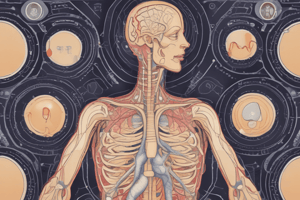Podcast
Questions and Answers
What is the primary function of the hypothalamus in the endocrine system?
What is the primary function of the hypothalamus in the endocrine system?
- To link the nervous system to the endocrine system (correct)
- To secrete insulin for blood sugar control
- To produce only releasing hormones
- To regulate metabolism through hormones
What hormone is responsible for lowering blood calcium levels?
What hormone is responsible for lowering blood calcium levels?
- Parathyroid hormone (PTH)
- Cortisol
- Calcitonin (correct)
- Insulin
Which part of the adrenal gland is responsible for secreting catecholamines?
Which part of the adrenal gland is responsible for secreting catecholamines?
- Thyroid follicle
- Cortex
- Corpus luteum
- Medulla (correct)
What type of feedback mechanism is primarily used to regulate thyroid hormone levels?
What type of feedback mechanism is primarily used to regulate thyroid hormone levels?
Which hormone is associated with increasing blood sugar levels?
Which hormone is associated with increasing blood sugar levels?
Which gland is often referred to as the 'master gland' due to its regulatory functions over other endocrine glands?
Which gland is often referred to as the 'master gland' due to its regulatory functions over other endocrine glands?
What distinguishes lipid-soluble hormones from water-soluble hormones in their mechanism of action?
What distinguishes lipid-soluble hormones from water-soluble hormones in their mechanism of action?
Which disorder results from an insulin deficiency or resistance?
Which disorder results from an insulin deficiency or resistance?
What is the role of testosterone produced by the testes?
What is the role of testosterone produced by the testes?
Which of the following is NOT a function of the endocrine system?
Which of the following is NOT a function of the endocrine system?
Flashcards are hidden until you start studying
Study Notes
Overview of the Endocrine System
- The endocrine system consists of glands that produce and secrete hormones.
- Hormones regulate various body functions and maintain homeostasis.
- Key functions include metabolism, growth and development, tissue function, sleep, and mood.
Major Endocrine Glands
-
Hypothalamus
- Links the nervous system to the endocrine system.
- Produces releasing and inhibiting hormones that control the pituitary gland.
-
Pituitary Gland
- Often referred to as the "master gland."
- Divided into anterior and posterior lobes.
- Regulates other endocrine glands (e.g., thyroid, adrenal).
-
Thyroid Gland
- Located in the neck, regulates metabolism through T3 and T4 hormones.
- Produces calcitonin, which lowers blood calcium levels.
-
Parathyroid Glands
- Four small glands on the thyroid; regulate calcium levels through parathyroid hormone (PTH).
-
Adrenal Glands
- Located atop kidneys; consist of cortex and medulla.
- Cortex produces corticosteroids (e.g., cortisol, aldosterone) and androgens.
- Medulla secretes catecholamines (e.g., epinephrine, norepinephrine) in response to stress.
-
Pancreas
- Functions as both an endocrine and exocrine gland.
- Produces insulin (lowers blood sugar) and glucagon (raises blood sugar).
-
Gonads
- Ovaries (female) produce estrogen and progesterone; regulate menstrual cycle and pregnancy.
- Testes (male) produce testosterone; responsible for male development and reproduction.
Hormonal Regulation Mechanisms
-
Feedback Mechanisms
- Negative feedback: loop that reduces hormone output (e.g., thyroid regulation by TSH).
- Positive feedback: loop that enhances hormone output (e.g., oxytocin during childbirth).
-
Hormone Actions
- Can be classified as:
- Water-soluble hormones (e.g., insulin): bind to cell surface receptors and act through second messengers.
- Lipid-soluble hormones (e.g., steroid hormones): pass through cell membranes and act directly on DNA.
- Can be classified as:
Disorders of the Endocrine System
- Diabetes Mellitus: Insulin deficiency (Type 1) or resistance (Type 2) leading to high blood sugar.
- Hypothyroidism: Underactive thyroid, causing fatigue, weight gain, and cold intolerance.
- Hyperthyroidism: Overactive thyroid, leading to weight loss, increased heart rate, and anxiety.
- Cushing's Syndrome: Excess cortisol production, causing weight gain, high blood pressure, and skin changes.
- Addison's Disease: Insufficient adrenal hormone production leads to fatigue, low blood pressure, and skin darkening.
Key Concepts
- Homeostasis: The endocrine system plays a crucial role in maintaining physiological balance.
- Interconnectivity: The endocrine system works closely with the nervous system to coordinate body responses.
- Hormonal interactions: Hormones can have multiple effects and can interact with each other to influence bodily functions.
The Endocrine System
- The endocrine system comprises glands that produce and release hormones, playing a critical role in maintaining homeostasis.
- Hormones regulate various bodily functions, including metabolism, growth, development, tissue function, sleep, and mood.
Major Endocrine Glands
- Hypothalamus: Acts as a link between the nervous and endocrine systems, producing releasing and inhibiting hormones that control the pituitary gland.
- Pituitary Gland: Often called the "master gland" due to its regulation of other endocrine glands, divided into anterior and posterior lobes.
- Thyroid Gland: Located in the neck, regulates metabolism through T3 and T4 hormones, and produces calcitonin to lower blood calcium levels.
- Parathyroid Glands: Four small glands situated on the thyroid, responsible for regulating calcium levels through parathyroid hormone (PTH).
- Adrenal Glands: Located on top of the kidneys, consisting of the cortex and medulla.
- Cortex: Produces corticosteroids like cortisol and aldosterone as well as androgens.
- Medulla: Secretes catecholamines (epinephrine and norepinephrine) in response to stress.
- Pancreas: Functions as both an endocrine and exocrine gland, producing insulin (lowers blood sugar) and glucagon (raises blood sugar).
- Gonads:
- Ovaries (female): Produce estrogen and progesterone, regulating the menstrual cycle and pregnancy.
- Testes (male): Produce testosterone, responsible for male sexual development and reproduction.
Hormonal Regulation Mechanisms
- Feedback Mechanisms:
- Negative feedback: A loop that reduces hormone output, as seen in thyroid regulation by TSH.
- Positive feedback: A loop that enhances hormone output, exemplified by oxytocin release during childbirth.
- Hormone Actions:
- Water-soluble hormones: Bind to cell surface receptors and act through second messengers, an example being insulin.
- Lipid-soluble hormones: Pass through cell membranes and act directly on DNA, like steroid hormones.
Disorders of the Endocrine System
- Diabetes Mellitus: Results from insulin deficiency (Type 1) or resistance (Type 2), leading to elevated blood sugar levels.
- Hypothyroidism: An underactive thyroid gland, causing fatigue, weight gain, and cold intolerance.
- Hyperthyroidism: An overactive thyroid gland, leading to weight loss, increased heart rate, and anxiety.
- Cushing's Syndrome: Excessive cortisol production, causing weight gain, high blood pressure, and skin changes.
- Addison's Disease: Insufficient adrenal hormone production, resulting in fatigue, low blood pressure, and skin darkening.
Key Concepts
- Homeostasis: The endocrine system plays a crucial role in maintaining the body's internal balance.
- Interconnectivity: The endocrine system works closely with the nervous system to coordinate body responses.
- Hormonal interactions: Hormones can have multiple effects and can interact with each other to influence bodily functions.
Studying That Suits You
Use AI to generate personalized quizzes and flashcards to suit your learning preferences.




